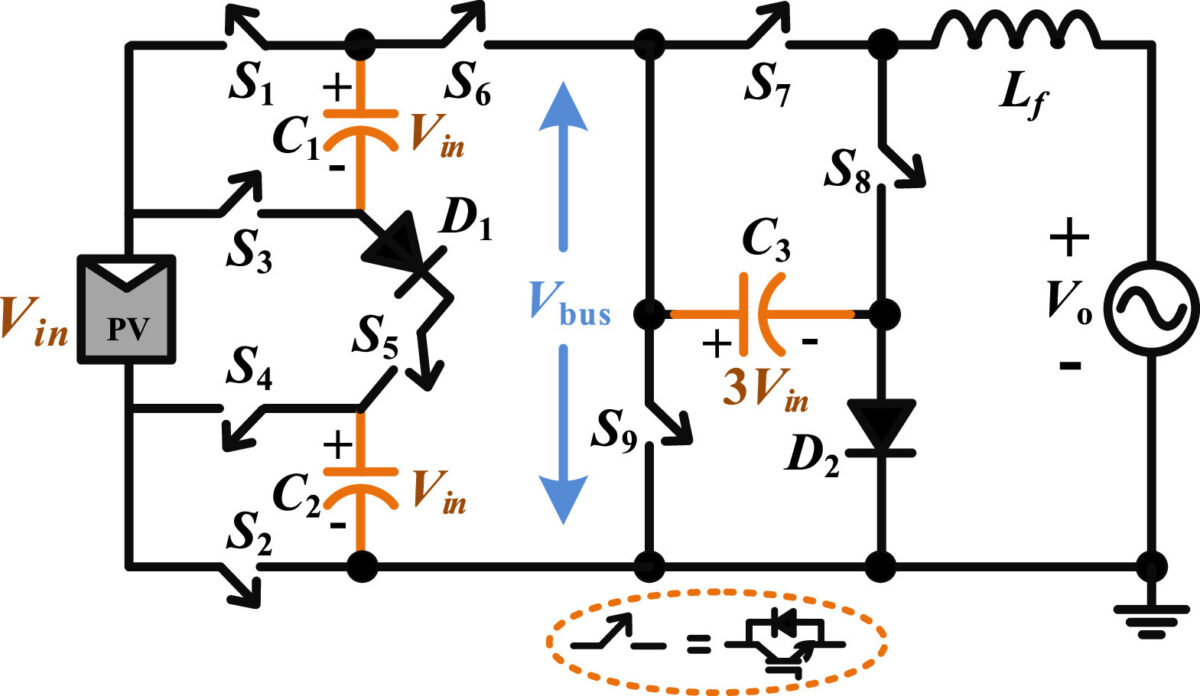Researchers led by the Pandit Deendayal Energy University in India have introduced a new multilevel solar inverter with a single DC input and switched capacitors instead of resistors.
Switched capacitors are discrete-time circuits that exploit the charge transfer in and out of a capacitor as controlled by switches. They offer the advantage of being easily implemented on an integrated circuit and being able to move a charge proportional to the voltage difference. A resistor, by contrast, achieves the same result only in a continuous manner.
Called 7L-SC-MLI, the proposed inverter concept has a 7-level structure and relies on nine switches, two diodes, and three capacitors. “All the switches have an anti-parallel diode across them to allow the load current to path in forward and reverse,” the scientists explained. “The self-balancing of the capacitors is achieved by the parallel charging and series discharging concept.”
The device performance was tested under a series of simulations to assess voltage stress and boosted output. “Input source voltage is considered fixed as 100 V and MOSFET switches with anti-parallel diodes are selected in MATLAB/Simulink,” the researchers noted, adding that the PV grid-tied mode simulation analysis was carried out under a closed loop control.
Popular content
In the simulations, the inverter is operated at a 5 kHz switching frequency and a 50 Hz grid frequency. The PV system is assumed to have a capacity of 129 W, a maximum voltage of 17.38 V, and a maximum current of 7.43 A. “The maximum dc-link voltage is maintained at 100 V similar to the open loop study,” the academics said. “The grid voltage of 250 V is considered, which is interfaced with the proposed circuit through an LC filter 80 mH and 330 µF.”
After concluding the simulations, the researchers built a 500 W inverter prototype based on the proposed architecture. They tested the device under different loads, making changes in modulation index, and changes in frequency of operation, and they found that the inverter achieves a high efficiency, despite switching, conduction, and capacitor voltage ripple losses. “The proposed topology operates satisfactorily under any adverse condition,” they stated.
The new inverter technology is presented in the paper “Single-phase switched-capacitor boost multilevel inverter interfacing solar photovoltaic system,” which was recently published in e-Prime – Advances in Electrical Engineering, Electronics and Energy. The research group includes scientists from the C.V. Raman Global University and the R.V. College of Engineering.
This content is protected by copyright and may not be reused. If you want to cooperate with us and would like to reuse some of our content, please contact: editors@pv-magazine.com.



By submitting this form you agree to pv magazine using your data for the purposes of publishing your comment.
Your personal data will only be disclosed or otherwise transmitted to third parties for the purposes of spam filtering or if this is necessary for technical maintenance of the website. Any other transfer to third parties will not take place unless this is justified on the basis of applicable data protection regulations or if pv magazine is legally obliged to do so.
You may revoke this consent at any time with effect for the future, in which case your personal data will be deleted immediately. Otherwise, your data will be deleted if pv magazine has processed your request or the purpose of data storage is fulfilled.
Further information on data privacy can be found in our Data Protection Policy.